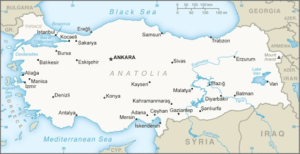In news
Recently, the Turkish parliament passed a bill that would increase the monitoring of civil society groups. The act is called Preventing Financing of Proliferation of Weapons of Mass Destruction
Key highlight of the bill
- It was proposed by president Recep Tayyip Erdogan’s ruling Justice and Development party in order to comply with UN Security Council’s recommendations to keep terror financing and money laundering in check.
- The Bill has come following the 2019 report on Turkey prepared by the intergovernmental body Financial Action Task Force (FATF) meant to fight money laundering and terror financing.
- It consists of 43 articles and has made changes to seven laws on Turkey’s Law of Associations and is meant to keep Turkey from being blacklisted by the Paris-based watchdog of terror financing.s
Implications of the bill
- It gives the Turkish government the power to appoint trustees to non-governmental organisations (NGOs), to suspend their activities, seize their assets and monitor their sources of funding.
- Critics and human rights activists are seeing this move as a way to crack down on dissidents in a country where civil society is already not very free.
- It may target pro-democrats, especially thousands of journalists, bureaucrats, academics and judges
- Turkish prosecutors ordered the arrest of nearly 700 including military and justice ministry personnel, as part of its moves against those accused of being involved in a 2016 coup attempt to overthrow Erdogan’s government.
Criticism of the bill
Critics are seeing certain provisions of the bill as arbitrary and believe that it violates the provisions under the Turkish constitution since it interferes with the right to freedom of association.
A brief note on Turkey
- Turkey, officially the Republic of Turkey, is a transcontinental country located mainly on the Anatolian Peninsula in Western Asia, with a smaller portion on the Balkan Peninsula in Southeastern Europe
- Modern Turkey was founded in 1923 from the remnants of the defeated Ottoman Empire by national hero Mustafa KEMAL, who was later honored with the title Ataturk or “Father of the Turks.” Under his leadership, the country adopted radical social, legal, and political reforms.

- After a period of one-party rule, an experiment with multi-party politics led to the 1950 election victory of the opposition Democrat Party and the peaceful transfer of power.
- The Turkish Government conducted a referendum on 16 April 2017 in which voters approved constitutional amendments changing Turkey from a parliamentary to a presidential system.
- The amendments went into effect fully following the presidential and parliamentary elections in June 2018.
- The President of Turkey is both the head of state and head of government. Turkey’s political system is based on a separation of powers.
















